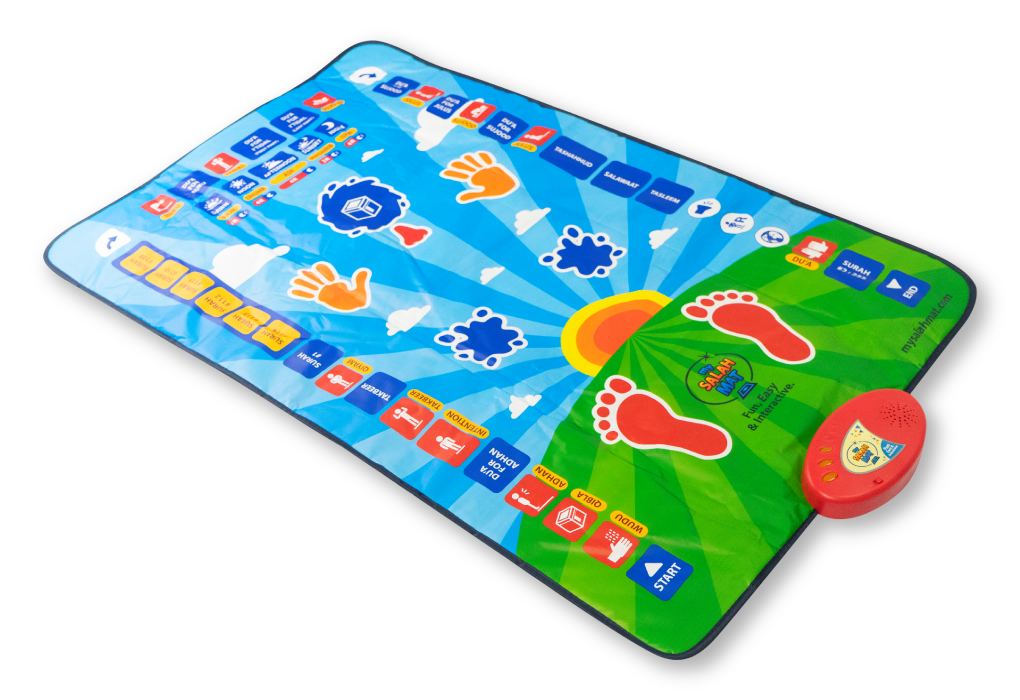How to Introduce Allah (SWT) to my Kids

The concept and existence of Allah (SWT) is a difficult topic to teach a child about. Many Muslims spend their whole lives connecting and trying to understand Allah (SWT) - so how can you explain something as complex and infinite to a child? This is a situation many parents find themselves ihan. However, with the right approach, there are ways to begin your child’s spiritual journey and give them an understanding of Allah (SWT).
In the following post, we’re going to give you some guidance on how you can introduce the concept of Allah (SWT) to your kids - focusing on some important rules to keep in mind when exploring Islam and creating a life-long connection.
Explaining the basics
Even though the nature of Allah (SWT) is an expansive topic, you can start your child off with the basics. Questions about the origin of life are common for children - it’s human nature to want to know where you come from and what made the reality we all share. This offers you a great chance to explain to them the existence of God. You don’t have to go into detailed philosophy yet, simply break down the main features of Allah (SWT):
- Allah (SWT) is the creator of the Universe (you can simplify this to “world” for your child).
- Allah (SWT) is all powerful.
- Allah (SWT) is a force of good that wants all humans to live in peace.
These are examples of some of the key qualities of Allah (SWT) that you can introduce to a child of almost any age. If your child is older or more inquisitive, you can extend this to explaining that it is the duty of all Muslims to follow the teachings laid out by Allah (SWT) in the Quran and through the teachings of the prophets.
Teaching through stories
One of the best ways to introduce your child to the idea of Allah (SWT) is through storytelling. Islam is rich with stories from the Quran and the traditions of the Prophet Muhammad (SAW) that illustrate the attributes of Allah (SWT) and the importance of faith and good deeds. Narrating these stories in a simple, engaging way will capture your child’s imagination and help them to grasp more abstract concepts.
A good example of a story you could tell is the story of the Prophet Ibrahim, and how his unwavering faith in Allah (SWT) led to miraculous events in his life. By using stories like this, children can learn about the power and mercy of Allah (SWT) in a way that truly resonates with their level of understanding.
Introduce an early connection through prayer
One of the main ways of connecting with Allah (SWT) is to pray. Introducing your child to the wonders of prayer at a young age is a surefire way to create an early connection with Allah(SWT). Teaching your child to perform Salah has many benefits for their life, including better reflection, discipline, and spiritual understanding.
Depending on the age of your child they may struggle with the complexities of prayer at first, but there are many modern learning tools that can help you to teach them. Smart interactive prayer mats are a new, innovative way to introduce your child to prayer.
Explore the names of Allah (SWT)
In Islam, Allah (SWT) is known by many names, each reflecting a different aspect of His divine nature and attributes. Introducing children to the names of Allah can provide them with a deeper understanding of His greatness and foster a sense of reverence and awe. Here are a few names of Allah (SWT) that you can teach your children:
- Ar-Rahman (The Most Merciful): This name emphasizes Allah's boundless mercy and compassion towards His creation. Teach children that Allah's mercy encompasses everything and that seeking His forgiveness is always encouraged.
- Al-Ghafoor (The All-Forgiving): This name highlights Allah's willingness to forgive the sins of His servants upon sincere repentance. Help children understand the importance of seeking forgiveness and the concept of second chances.
- Al-Malik (The Sovereign): Allah is the ultimate ruler and owner of all things. Teach children that everything in the universe belongs to Allah, and He has complete control over it.
- Al-Wadud (The Loving): Allah's love for His creation is infinite and unconditional. Encourage children to reciprocate this love by obeying His commands and showing kindness to others.
- Al-Hakeem (The Wise): Allah's wisdom is perfect, and His decrees are always just and beneficial. Help children trust in Allah's wisdom, even when things may not go as
planned.
- Al-Qadir (The All-Powerful): Allah has the power to do anything He wills. Teach children to rely on Allah's strength and to pray to Him for help and guidance.
As you introduce each name, provide examples from everyday life or stories from Islamic history that illustrate its meaning and significance. Encourage children to memorize and reflect on these names, fostering a deeper connection with Allah (SWT) and a greater appreciation for His attributes. Through learning about the names of Allah, children can develop a sense of awe and reverence for their Creator, laying the groundwork for a strong spiritual foundation.
Encouraging questions
It's important to create an environment where children feel comfortable asking questions about Allah (SWT) and Islam. Encourage curiosity and provide age-appropriate answers to their inquiries. If you don't know the answer to a question, it's okay to say so and offer to find the answer together. This not only fosters a deeper understanding of the faith but also strengthens the bond between parent and child.
Final Thoughts
Introducing Allah (SWT) to your children is a journey filled with opportunities for growth, understanding, and connection. By starting with the basics, exploring the names and attributes of Allah, and incorporating Islamic practices and teachings into their daily lives, you can guide your children on a path of spiritual discovery and enlightenment.
Remember to create an open environment of curiosity and love, where questions are welcomed, and knowledge is shared. As you embark on this journey together, may Allah (SWT) bless you and your family with wisdom, guidance, and an enduring faith that strengthens with each passing day.















 Liquid error (snippets/@AlternatingContentX line 127): Could not find asset snippets/CustomTexts-.liquid
Liquid error (snippets/@AlternatingContentX line 127): Could not find asset snippets/CustomTexts-.liquid